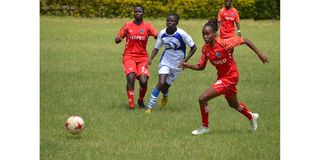It's high time women speak up in local football circles

Diana Koskey (centre) of Nakuru Queens and Anna Ongunga (left) and Pauline Naise of Kisumu All Starlets (right) vie for the ball during their Women Premier League match at Nakuru Agricultural Society of Kenya (ASK) show grounds on Saturday, May 22, 2021. Nakuru Queens won 3-1.
What you need to know:
- Their insistence on silence has reached toxic levels, and it is sad that they who are feeling the pinch have chosen cowardice instead of standing up for the truth
- The curtains came down on the KWPL last weekend, but you probably didn’t hear about it, because the usual noise regarding who gets what is back
- Clubs from Zone 'B' are slightly more willing to talk, but they are powerless in the current matrix where most Zone 'A' clubs, seem to be reading from the federation’s script
When the history of post-millennium Kenyan football is written, the blame for the stunted growth and lack of accountability on every level of the game will be placed solely on the individuals who have held top positions at “Kandanda House”.
If my opinion will be sourced during the compilation of that history, I will have to add that where women’s football is concerned, the players, coaches, clubs and match officials are equally guilty.
Their insistence on silence has reached toxic levels, and it is sad that those who are feeling the pinch have chosen cowardice instead of standing up for the truth.
The curtains came down on the KWPL last weekend, but you probably didn’t hear about it, because the usual noise regarding who gets what is back. There are murmurs all over, including on social media, of complaints coming from the women’s league, but all of it is being raised by individuals who are outside that league.
Teams are yet to receive the second tranche of monies given to them by Fifa in response to the Covid-19 pandemic and the Sh200,000 promised to them from the Sh10million extended by BetKing as sponsorship for the men’s top flight league is nowhere to be seen.
Yet silence reigns supreme, with the girls too scared to lose their places in the national team and their respective clubs and too keen on staying within the federation’s good books. Journalists looking for accurate, verifiable details of these intrigues find that their hands are tied by the silence. Try finding a corroborating source from women’s wing of FKF. The women who work there will refer you to the CEO, who is the same person who has okayed those injustices in the first place.
And if you contact the players, coaches, referees or team managers, they will either refuse to speak or ask you not to quote them, because they have been gagged by you know who.
Then comes the rift. Clubs from Zone B are slightly more willing to talk, but they are powerless in the current matrix where most Zone A clubs, perhaps due to their proximity to “Kandanda House” seem to be reading from the federation’s script. This segregation further complicates the women’s predicament.
By choosing silence, the girls have agreed to live in an open prison where every season is the same. It is sad that on top of being grossly under represented, we cower and wait for someone else to play saviour whenever we have a chance to be heard. How then can we have any confidence our story will be told with due accuracy, urgency and sensitivity?
The Internet has bettered society by giving marginalised voices a platform to be heard. Let’s not stifle it by making silence the only way to survive. The #BlackLivesMatter and #MeToo movements are inspiring examples of how social media has bolstered attention around important issues.
Silence isn’t an effective way to hold people to account. In this context, silence is just punishment without hope of redemption.




